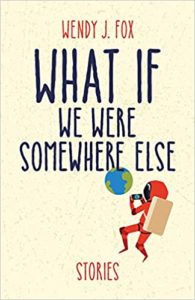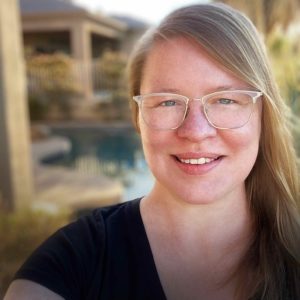
 Review by Emily Webber
Review by Emily Webber
If you’ve ever worked an office job or wondered how people endure toiling away in a cubicle farm, you’ll tear through Wendy J. Fox’s linked story collection, What If We Were Somewhere Else. Each story imagines the lives of a group of coworkers at an unnamed corporation. But, beyond that, each of these characters is thoroughly human, searching for what will satisfy them both at work and in their personal lives.
The collection opens with “The Book of Names, a Spreadsheet” which serves as an introduction to the characters and the office they inhabit. It describes the quirkiness of office life, the maze of desks, the peculiar sounds of an office, the way it is impossible to get the temperature right. We recognize the relationships that develop when people are thrown together five days a week for years.
In my office, my coworkers complained about the HVAC; they complained about Kate, my boss, and they complained about the roaches that crept around the copy machine and slunk through the restrooms. I didn’t like the roaches either, but the complaining, it just wore me out. (39)
The overall structure of the collection is well thought out. Each story cycles through the seven different characters and then loops back to those characters in the same order to continue their stories. The reader sees how the characters’ lives are connected through work, then diverge, and in some cases, come back together.
In these stories, Kate comes to terms with the end of her marriage. Melissa leaves commune life in search of something different. Laird reflects on his relationship with his oldest childhood friend and his family. Heather maps out her life in spreadsheets, and like Sabine, wonders if she’s in the right romantic relationship, while Christian drifts from woman to woman, not entirely letting go of anything.
The cycle of the stories recalls how our past comes back to us and how we hold on to memories. We learn how these characters find their jobs, manage to keep them or more likely lose them, and what happens in the aftermath. There’s a lack of confidence to their choices, both in what they do to make a living and who they love.
There were a lot of things I’d had to learn to do—how to write a resume, how to dress, how to plug in the headphones to keep the sounds of the office out. How to remind myself that I’d picked this. (53)
While the corporate world can be ruthless and layoffs loom, small moments of tenderness shine in each story. In “The Old Country,” Laird watches as his best friend Cale leaves for college and he struggles with how to express his emotions.
On the day Cale left for the dorms, I helped him load his stuff into the car and I kept wondering if I should tell him that I loved him, because I did really love him, but when he went to get in the passenger side, his dad already belted in, I didn’t have the words. (27)
When we meet Laird again, he longs to make his mother the perfect cup of coffee and breakfast as a way to thank her for being a single parent. Michael finds a father figure and loving relationship with his stepdad. Heather finds unexpected care when a man helps her shower after she breaks her foot. It is in these situations that the characters, away from their jobs, find moments of satisfaction.
The collection takes a surprising and welcome turn towards the end with the story “Human,” which revisits Michael and Sabine in 2030. Michael’s mom is dead, and he’s just left his stepdad at a nursing home. There are food shortages and weather disasters induced by climate change. The government is trying to offload people to a moon colony. There’s a larger feeling that something sinister is at work that isn’t felt in the other stories. After reading about jobs, personal struggles, and doomed relationships, it becomes clear that while these characters have been preoccupied with the everyday trials of life, significant change has been happening on a much larger scale. Sometimes we can’t shift our view from our own personal bubble, whether because of fear, or selfishness, or comfort, so that it can feel like nothing is changing on a grand scale. As if all the big things we’ve been warned about, like climate change, haven’t come to pass until they do and then it is too late. But, while the world may be on the brink of disaster in “Human,” it’s a second chance for Michael, and even in the lowest and darkest moments, there can be some light.
“Human” is followed by two other stories that end out the collection. “Not Me” and “More Terrible Ways to Make a Living” are beautiful, somber ones the revisit Kate and Christian, two of the characters that seem to drift most aimlessly. Christian is living with the consequences of his choices in relationships. Kate seems to have no grasp on her identity now that her marriage has ended and she lost her job. These stories take place in the time right before “Human,” right as the world is inching closer to the edge of disaster, a warning of what’s to come.
Fox is the author of the novel, If the Ice Had Held, both of her books published by the Santa Fe Writer’s Project. Both Fox’s novel and short story collection are full of complex characters that make mixed choices in life. The characters in What If We Were Somewhere Else try to find happiness through their work, recover from failures, and assess their definition of family. Each story shows that our greatest hope in finding fulfillment is in the small, personal moments—rescuing a friend, reconnecting with family, helping someone wash their hair, rediscovering love later in life—even if the world around us makes no sense and is disintegrating into disaster.
What If We Were Somewhere Else by Wendy J. Fox
978-1951631055
Santa Fe Writer’s Project, November 2021
167 pages
Emily Webber has published fiction, essays, and reviews in the Ploughshares Blog, The Writer magazine, Five Points, Split Lip Magazine, Brevity, and Fourth & Sycamore. She’s the author of a chapbook of flash fiction, Macerated, from Paper Nautilus Press. You can read more at www.emilyannwebber.com and @emilyannwebber.
